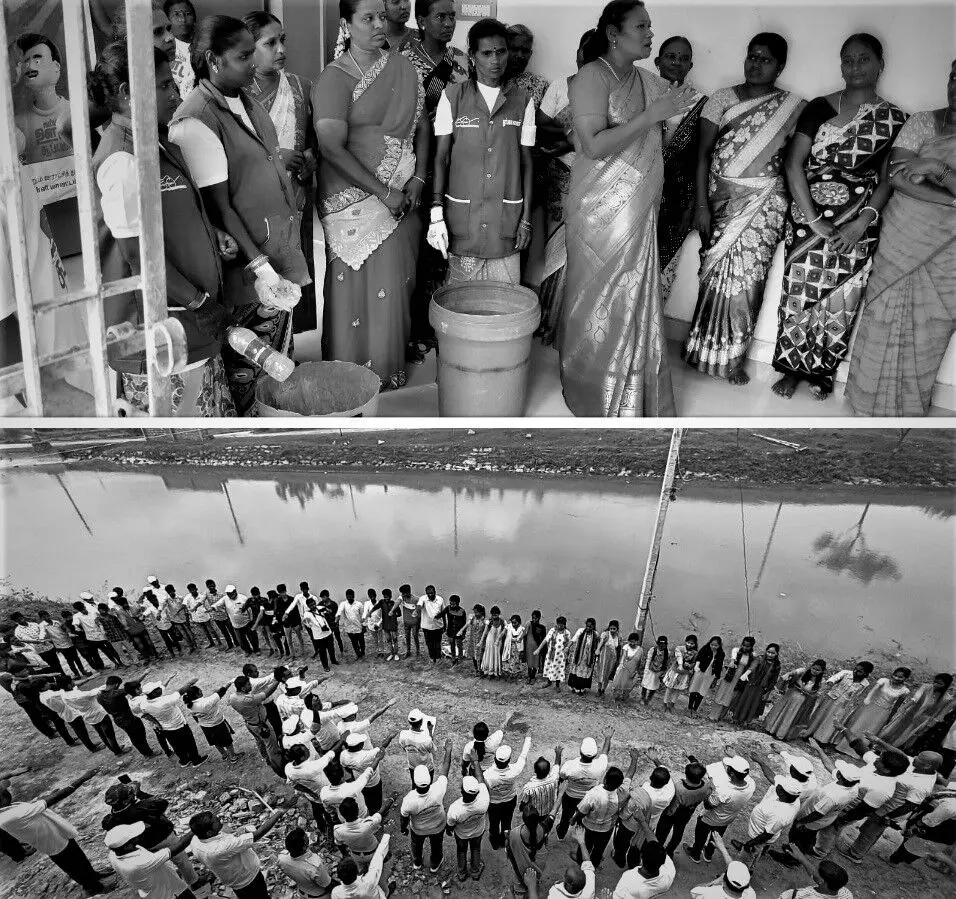A liberating endeavour
SBM-G has been roping in stakeholders at local levels, particularly women, to free the nation from clutches of drudgery and unsanitary conditions

Swachh Bharat Mission-Grameen has reached every nook and corner of the country in the form of a people’s movement. Not only has it changed behaviours, but it has also become a household name. Such has been the impact of the Swachh Bharat Mission – a flagship programme, promoted by the Hon’ble PM.
The ongoing process has been possible with the support of all the State and District machinery, Development Partners, NGOs, Panchayat leaders and the communities that are making massive efforts to contribute to the health and well-being of their communities in the spirit of a Swachh and Swasth Bharat.
South African anti-apartheid activist and father of modern South Africa, Nelson Mandela had once said, “Freedom cannot be achieved unless women have been emancipated from all forms of oppression.” One cannot but agree with this sentiment. Having been working with the Department of Drinking Water and Sanitation for over a year now, I am privileged to be working with two of the country’s flagship programmes - the Swachh Bharat Mission Grameen and the National Jal Jeevan Mission – both of which are empowering women, liberating them from endless drudgery, and disease.
It is pertinent to point to the freedom from unhygienic practices and unsanitary conditions that the SBM-G Mission is working towards. While it has brought about access to sanitation to all sections of society, the ‘pro-poor' and 'pro-women’ campaign has also freed women from having to wait until dark to relieve themselves, while providing protection, dignity and numerous health benefits.
The National Jal Jeevan Mission, on the other hand, has taken a step further, becoming a godsend to rural women living in water-scarce regions of the country. Thus far, through the noble missions of SBM-G and NJJM over 11 crore individual household toilets have been constructed and more than 10.90 crore household tap water connections have been provided.
Additionally, SBM-G has put India on the road to achieving the UN Sustainable Development Goal 6.2, to achieve access to adequate and equitable sanitation and hygiene for all, and end open defecation, paying special attention to the needs of marginalised, women and girls and those in vulnerable situations, by the year 2030.
Lighthouse initiative
The country is certainly on track with the SBM-G, although a lot more needs to be done. Recognising the role of the private sector in Swachh Bharat Mission Grameen and that 'swachhata' is everybody’s business, DDWS is collaborating with the India Sanitation Coalition (ISC) at FICCI, a multi-stakeholder platform that together with corporate partners, and Development Partners, works to achieve sustainable Solid and Liquid Waste Management (SLWM) in villages of India. In the first phase, the aim is to create a model or ‘lighthouse’ Gram Panchayats’ across fifteen states that would successfully implement SLWM arrangements that could be scaled up across the country to achieve the target of making all our villages an ODF Plus Model.
Swachh Survekshan Grameen 2023
Also underway is the Swachh Survekshan Grameen 2023 – a survey that ranks states and districts on the basis of their performance on key quantitative and qualitative SBM-G parameters. The objectives of SSG 2023 are to generate active participation at the village, district and State levels in SBM-G Phase II; create awareness about ODF Plus model villages; to assess and learn through peer verification; create a healthy competition among GPs and to recognise winners at all levels.
To accelerate momentum, DDWS has also organised various iconic campaigns that have made a considerable impact. Among them is the Retrofit to Twinpit Abhiyan which promotes simple “on-site” technologies by retrofitting the existing single-pit toilets into twin-pit toilets and connecting septic tank toilets to air vents and soak pits. The campaign also aims to generate awareness about the safe disposal of faecal sludge in rural households.
Under Sujlam 1.0 and 2.0 campaigns, individual and community soak pits were constructed in households and establishments for the effective treatment of greywater generated. The campaign ensured minimal stagnation of wastewater and checked its discharge into the village ponds. More than 23 million soak pits were constructed during both campaigns.
As far as GOBARdhan is concerned, it supports villages to safely manage their cattle, agricultural and organic waste, converting the same into clean fuel and organic manure to improve environmental sanitation and curb vector-borne diseases. In this regard, the Government of India provides technical assistance to every district and financial support of up to Rs. 50 lakhs per district to achieve safe disposal of cattle dung and organic waste. So far, there are more than 500 GOBARdhan plants around the country.
Information, Education & Communication has played a pivotal role in spreading awareness and promoting SBM-G activities and from the outset most of the activities have led to community participation that has led to communities taking ownership of the projects to ensure sustainability. Swachhata Hi Sewa, Swachhata Runs, Swachh Bharat Diwas, and United India for Swachhata, are examples of such involvement. Much focus is also being given to strengthening capacities, given that SBM-G Phase II requires cost-effective and cost-viable technological interventions, requiring specialised skills in the construction of assets.
In order to encourage GPs to showcase ground-level initiatives in Menstrual Hygiene Management and to promote cross-learning among states, a National Film Competition for GPs on MHM was organised recently.
Menstrual hygiene has continued to be a cause of concern due to a lack of knowledge, persisting taboos, stigma, limited access to menstrual products and safe disposal mechanisms of used sanitary pads. Sensitising women and girls on MHM would go a long way in reducing the school dropout rate among girl students while improving their health and dignity.
The writer is Secretary, Dept of Drinking Water and Sanitation, Ministry of Jal Shakti. Views expressed are personal



